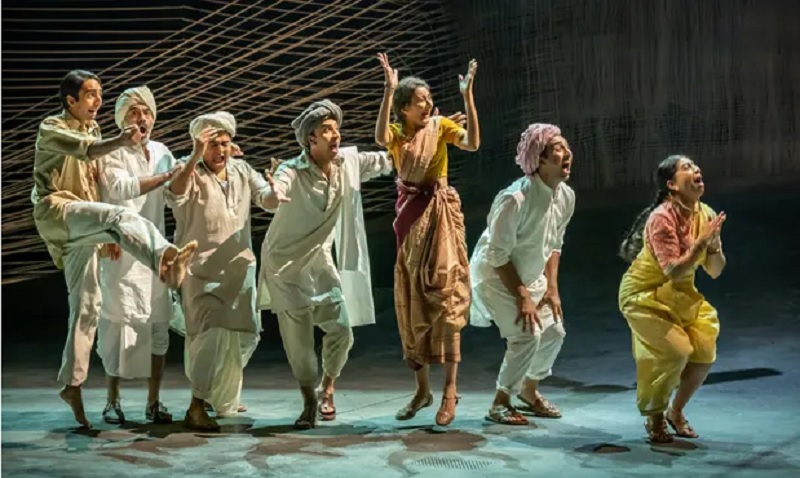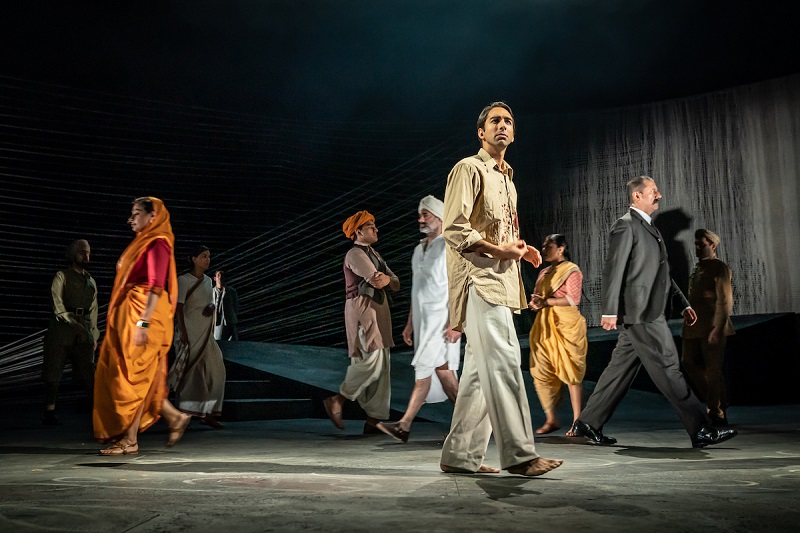“The Father and the Assassin” – National Theatre
Jeremy Malies on the South Bank
31 May 2022
You don’t see a version of the life story of Mahatma Gandhi for 40 years – the seminal one is Richard Attenborough’s 1982 film starring Ben Kingsley – and then two come along at once. Less than a year ago I reviewed Tanika Gupta’s monologue The Overseas Student at the Lyric Hammersmith in which Esh Alladi played a young Gandhi while he was studying law in London.

The ensemble. Photo credit: Marc Brenner.
Now, Paul Bazely plays him with all the mysticism and charisma you would expect in the world premiere of The Father and the Assassin at the National Theatre. The focus of this fine drama by Anupama Chandrasekhar (a former writer in residence at the National) is, as the title suggests, Gandhi’s assassin, the Hindu nationalist Nathuram Godse played by Shubham Saraf.
This is one of those rare pieces of theatre where you come out feeling that you are all the better for having absorbed a history lesson but through the mechanism of a play as an original work of art. A dramatized Wikipedia entry this ain’t.
Saraf demonstrates much technical skill in playing Godse from early childhood to adulthood. Nearly all of the play is seen though not necessarily evaluated from his viewpoint as narrator. Chandrasekhar writes in a Brechtian manner; there is no attempt to absorb us (however strong the script and acting) and we are often reminded that this is a play. Saraf comes out of character to make asides and even teases us by introducing a non-linear scene before instructing the other actors (it’s a 19-strong cast) to go back to a chronological approach. By contrast, there are sequences, usually the pivotal socio-economic history, where Godse is sidelined. Here, writing and direction hint that the commentary from the subsidiary characters is truthful and balanced.

Principal cast members and Shubham Saraf in foreground.
Photo credit: Marc Brenner.
Chandrasekhar makes much of the fact that, as an infant, Godse’s parents tried to persuade him and themselves that he was a girl for fear that there was a curse on their male children. (Three boys had died.) But Godse strikes me as having emerged unscathed from this. He is an uncomplicated clear-thinking young man who quickly becomes an extreme Hindu nationalist. Godse’s hatred of Gandhi began through contempt for the creed of Ahimsa (non-violence or more precisely the ethical principle of not causing harm to other living things) and hardened further when Gandhi presided over what Godse felt was a sell-out to Muslim leaders in territories that, after the partition of 1947, would become Pakistan.
One of the strongest elements of the play (involving the most compelling acting I have seen this year) has Dinita Gohil (who won plaudits a few years ago for her Viola in an RSC Twelfth Night) describing the refugee crisis and wholesale massacres that ensued. It’s the backbone, the true muscle of the play and one of the many scenes in which Chandrasekhar subtly prompts us to draw contemporary parallels although later on a laughably anachronistic and clunky reference to Brexit had me cringing. Saying this, I wonder whether with the possibility of a united Ireland becoming more credible, this play which already seems set to have a long shelf life may acquire another dimension or parallel.
Director Indhu Rubasingham often has the whole cast moving in intricate patterns on the Olivier stage without a sense of clutter and using its revolve effectively. She reserves the spotlight for Saraf who makes a grand entrance from the bowels of the stage. What impresses me most about Rubasingham’s handling of the piece is the subliminal way in which she implies that all this (however colourful and intense) is occurring in Godse’s recollections.

The ensemble and Shubham Saraf in foreground.
Photo credit: Marc Brenner.
Oliver Fenwick’s lighting is all shades of saffron and tamarind which create a heady musk, and Rajha Shakiry who is responsible for both set and costumes uses a restrained almost burnished palette throughout. At times there is a huge gauze backdrop which I take as being representative of Godse’s time as a tailor. Threads of a complex history are being disentangled for us, but at times there is too much factual detail.
There is plenty of well-honed humour, notably a sustained flow of wit in the final moments when, after Godse has been hanged in 1949, he is immediately confronted by Gandhi and, with their earthly battles over, the two ghosts swap loathing for banter. Godse was executed despite many pleas for clemency from notables including Gandhi’s children but Nehru (played here with all the gravitas you would expect by Marc Elliott) insisted he should pay the ultimate price.
This is a first-rate piece of new writing and my instinct is that I can trust Chandrasekhar (though not her plainly sectarian narrator) with the history; not once did I feel that she is taking anything other than an objective, meticulously researched interpretation of events. Opposing views always receive equal measure from the various characters and there is a tone of integrity as she changes constantly from a wide-angle to macro lens – family disputes to political events that would have involved thousands. It’s an impressive, durable, and probably malleable play that could be adapted for a smaller cast and venue.









